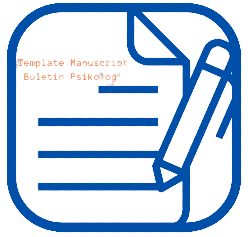Orientasi Tujuan, Atribusi Penyebab, dan Belajar Berdasar Regulasi Diri
Abstract
The aims of this research were: (1) to test the difference of self regulated learning based on goal orientation of senior high school students in Yogyakarta, (2) to test difference of self regulated learning based on causal attribution of senior high school students in Yogyakarta, (3) to test difference of self regulated learning based on interaction between goal orientation and causal attribution of high school students in Yogyakarta. Participants were 488 Grade XI students of SMA Negeri ”A” Bantul, SMA Negeri “B” Bantul, SMA Negeri “C” Sanden, and SMA Negeri “D” Bambanglipuro. Data were collected using self regulated learning scale, mastery goal orientation scale, performance goal orientation scale, causal attribution scale of success, and causal attribution scale of failure. The data were analyzed using the technique of analysis of variance. The results suggest that: (1) there is significant difference of self regulated learning based on goal orientation (F=36.814 p=0.000), (2) there is significant difference of self regulated learning based on causal attribution of success (F=31.081 p=0.000), (3) there is significant difference of self regulated learning based on causal attribution of failure (F=21.837 p=0.000), 4) there is significant difference of self regulated learning based on interaction between goal orientation and causal attribution of success (F=2.983 p=0.031), and 5) there is no significant difference of self regulated learning based on interaction between goal orientation and causal attribution of failure (F=2.444 p=0.063)
Keywords: self regulated learning, mastery goal orientation, performance goal orientation, causal attribution of success, causal attribution of failure
Keywords: self regulated learning, mastery goal orientation, performance goal orientation, causal attribution of success, causal attribution of failure
DOI: 10.22146/jpsi.6969
Refbacks
- There are currently no refbacks.
Copyright (c)






